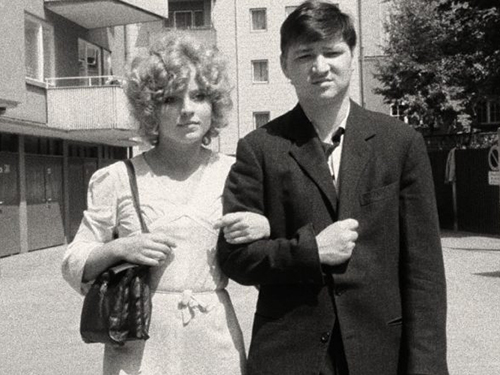
“Fassbinder’s second film, which became not only his first claim to fame and author status, but also gave him [...] valuable operating capital for years to come. Katzelmacher was liked, uniting the avantgarde critics (impressed by the disciplined formal experiments) and those who expected from the cinema a social message, for it commended itself by a prescient analysis of the Gastarbeiter problem, in addition to satirizing German petit-bourgeois ambitions and Bavarian complacencies. Katzelmacher’s avantgarde status was also based on the impression that Fassbinder was following Bertold Brecht’s anti-illusionist precepts. Organized into short tableau scenes, the images are curiously frozen and inert, doubly deprived of depth by Fassbinder’s head-on shots and static camera set-ups. When the camera does move, as in the lateral reverse tracking shots of the couples walking past a block of flats, a deliberately shallow space plays off the proscenium-stage against the illusionism of cinema. And yet, there is little evidence that a ‘model’ of social conflict is intended, in the manner of Brecht’s learning plays. Nor is Katzelmacher a filmed play, despite the fact that it derives from Fassbinder’s theatre-piece of the same title.
[...]
If Fassbinder tried to provoke, it was mostly in order to create a space of unconventional sympathy for his all too conventional characters. Katzelmacher builds up its powerful portrait of latent violence quite relentlessly, each tableau scene designed to show bigotry and prejudice clashing in non-communication. Yet instead of this pent-up violence releasing itself, for instance, in the repeatedly announced castration of Jorgos, the (pinteresque) verbal aggression merely fizzles out. The men gradually tolerate the foreigner in their midst, partly because beneath the macho talk they are all cowards, but also because they recognize that he is already ‘castrated’: as much a victim of the system as they are. They patronize him, not least because Elisabeth, his landlady, overcharges him for the rent, a fact they seem to approve of, more for its symbolic significance than for the financial benefit that one of them indirectly draws from it. Equally ingratiating is the Gastarbeiter’s own social Darwinism: only too ready to complain when a Turk is hired by his firm, lorgos turns out to be as much a racist as his German tormentors. This final irony neither explains nor excuses anything, and yet it closes the film on a suitably sour note.”
Thomas Elsaesser1
“The fifties economic miracle in Germany had led to an influx of over two million foreign workers by the end of the sixties, and the resentment and exploitation that often greeted them angered Fassbinder, who had as a teenager been friendly with many of the immigrants who lived in his father’s boardinghouses. He saw such treatment as a form of everyday fascism. But even if Fassbinder clearly shows sympathy for Jorgos’s plight, Katzelmacher (whose title is a derogatory Bavarian word for a foreigner, especially one from a Mediterranean country) is clinical in tone, a formal exercise that reflects a social reality in the most unadorned style possible. Fassbinder depicts modern Germany as being in a state of catatonia, perhaps held there by the ever-present burden of history. The camera rarely moves, and when it does – in a recurring series of tracking shots following pairs of characters as they mechanistically stroll down an otherwise abandoned street, accompanied by a repeated Schubert piano piece – it feels purposefully unnatural. Fassbinder is calling attention to cinematic form as well as social injustice and petty inhumanity.”
Michael Koresky2
- 1Thomas Elsaesser, Fassbinder’s Germany. History, Identity, Subject (Amsterdam: Amsterdam University Press, 1996), 45-46.
- 2Michael Koresky, “Eclipse Series 39: Early Fassbinder,” The Criterion Collection, August 2013.

